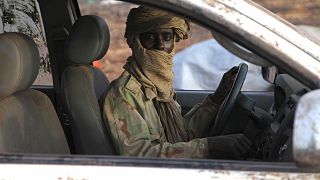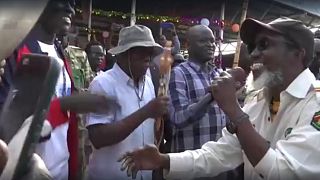South Sudan
A decade ago, South Sudanese Rosa Ghobrial packed up her life in Sudan to start anew in the newly independent South, but she has since been stranded in a ramshackle camp awaiting repatriation.
Ghobrial fled the ravages of Africa's longest civil war, between Arab-dominated northern Sudan and the largely Christian south, which seceded to become the world's newest country in July 2011.
She wanted to move with her family back to the south, to turn the page on grim memories of the 1983-2005 north-south conflict and build a life in South Sudan, a territory rich in oil and backed heavily by donors.
"I had moved to northern Sudan in 1983 to escape the war... and I was supposed to be repatriated with others after the South's independence," she told AFP.
But South Sudan descended into its own brutal civil war just two and a half years after winning independence, driven by a power struggle between its president and his deputy.
That put repatriations on hold, even as many South Sudanese had gathered in transit camps known as "Open Areas" -- haphazardly built tents that offer little protection from the sweltering summer heat or heavy seasonal rains.
"I have been stuck here for a decade now with no end in sight," Ghobrial lamented, sitting in a burlap tent at al-Takamol camp on the eastern outskirts of Sudan's capital Khartoum.
Thousands of South Sudanese families like hers remain stuck in limbo at such departure points, suffering shortages of food, water, and access to basic needs.
"They barely get any aid, unlike refugees in other camps in Sudan" that have the status of proper camps, said Issac al-Shafie, who supervises South Sudanese refugee sites in east Khartoum.
'Unknown fate'
South Sudan split from the north six years after a 2005 peace deal under Sudan's then-president Omar al-Bashir, whose rule was marred by multiple internal conflicts and civil war.
His government sought to repatriate tens of thousands of South Sudanese after secession, but instead, refugees flowed in the other direction from late 2013.
Sudan hosts the largest South Sudanese refugee population, of 792,000, more than half of whom arrived after the outbreak of South Sudan's civil war in December that year, according to the United Nations refugee agency UNHCR.
Khartoum state alone hosts at least 37,000 South Sudanese who are considered "the most vulnerable" among the overall refugee population state-wide, the UN said.
Shafie says most camp residents rely on Sudanese locals for food and water, despite the host country's own biting economic hardship.
Under Bashir, Sudan's economy was already reeling from severe blows including the 2011 secession of the oil-rich south and decades-long US sanctions.
Conditions have become harsher as Sudan has plunged deeper into economic crisis amid a rocky political transition following Bashir's ouster in April 2019, when enormous street protests sparked his removal by the army.
And for South Sudanese refugees, many of whom relied on menial work as domestic workers or day labourers, such jobs have become hard to find.
"My husband managed to find a job as a farmer outside Khartoum," said 46-year-old Christina, a mother of six living in the camp. "He visits only once a month."
"Otherwise, we have nothing now and we barely get any aid."
Sabina Phillipe, a mother of nine, says she gave up looking for work after she was fired from a job in 2011 for being South Sudanese.
"We just don't belong here," she said.
Another refugee, Gabrial Khamees, shared her sentiment.
"Our problem is we are given very little attention, unlike other refugees in the country," he said. "And until today, our fate remains unknown."
While the key protagonists in South Sudan's civil war agreed a tentative peace deal in 2018, fighting among fragmented factions persists, making any return home unviable for many.
The UN Commission on Human Rights said earlier this year that localized violence in much of 2020 was worse in some areas of South Sudan than during the main five-year conflict.
AFP












01:52
UN's crucial humanitarian aid work faces a clouded future amid cuts in funds
02:00
Refugees in Kenyan camp face hunger after USAID funding freeze
Go to video
A decade on, Lesbos still bears the scars of the refugee crisis
01:37
Sudan faces rapidly-spreading cholera outbreak, 1000 daily cases in capital
01:11
'Devastating milestone': More than 4 million people have fled Sudan since start of civil war
01:12
Cameroon tops list of world's most neglected displacement crises